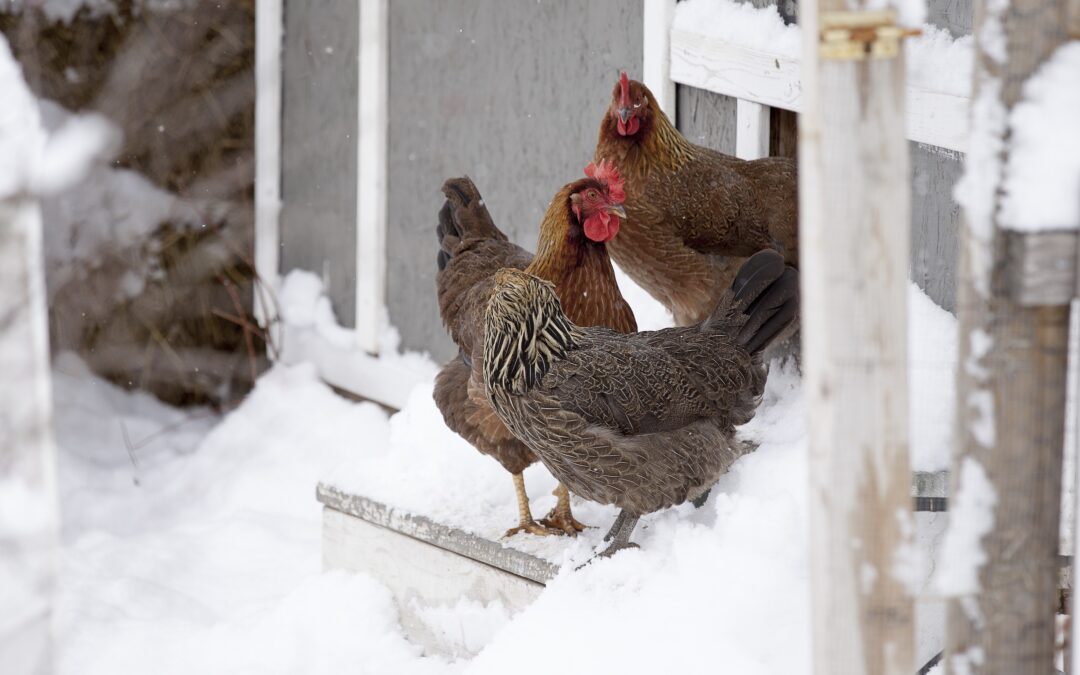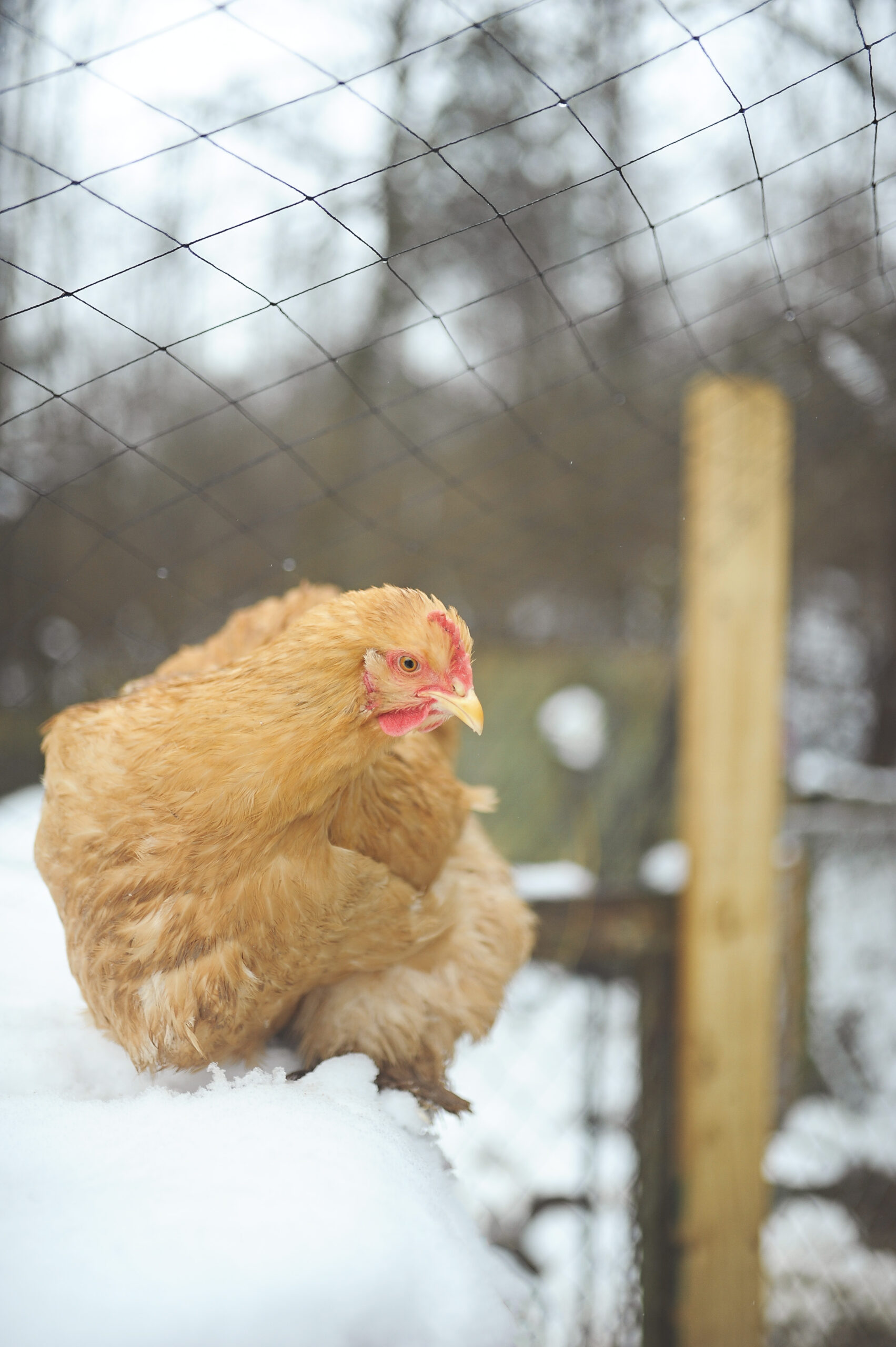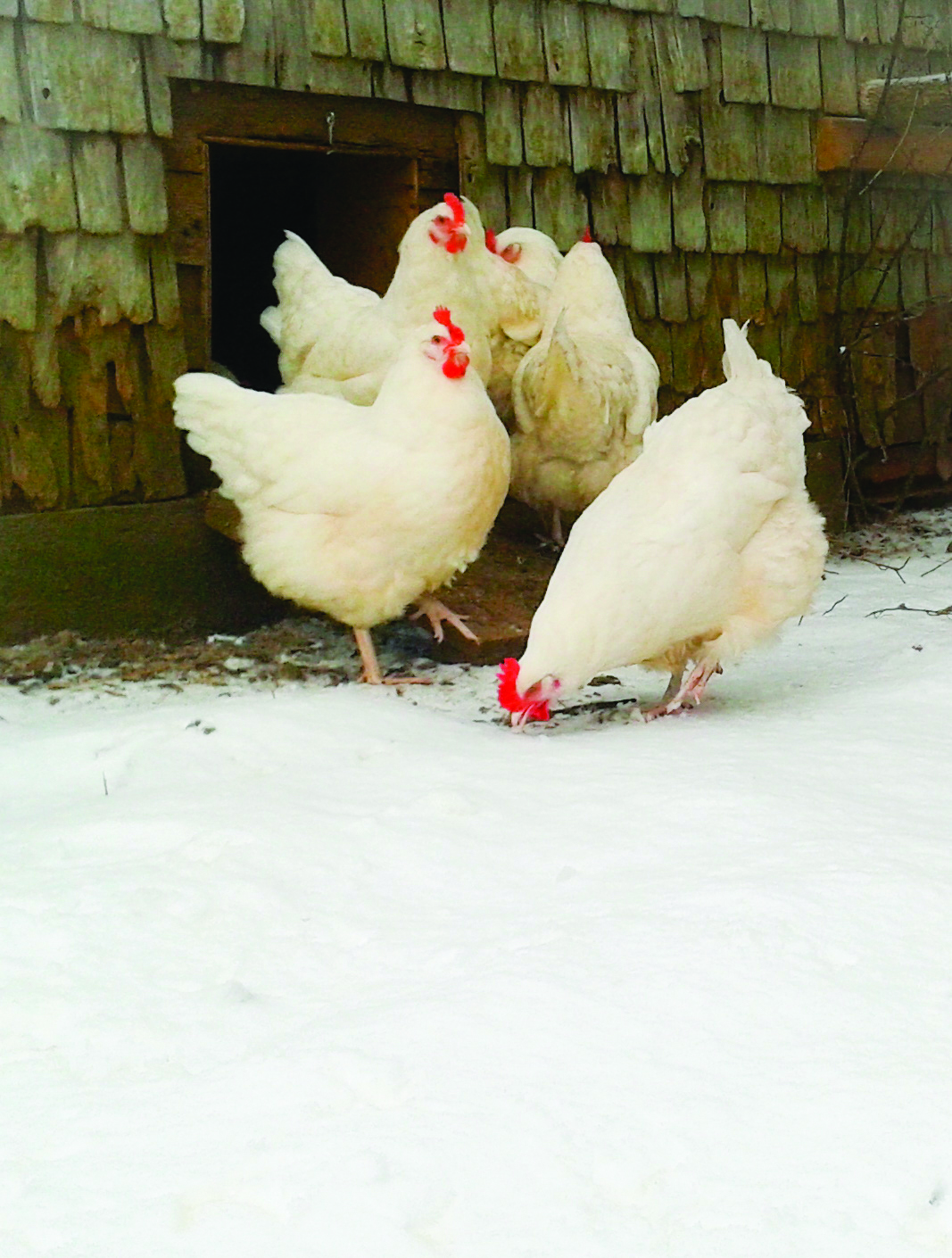While some of you are already in the thick of cold weather, many of us are just hitting the point of closing the coop windows and fluffing up the straw for winter in the coop. Keeping chickens comfortable during winter weather is a top concern for new chicken owners, and can even be cause for concern to seasoned poultry lovers, too. While most of us understand that chickens are hardy birds, the questions about winterize your chicken coop come in once the temperature dips below freezing, or in some areas, below zero.
Start Early
Winter weather conditions will vary widely, but the way chickens react to it similarly in most locations. Chickens are adaptable and resilient. If you winterize your chicken coop, you can keep your flock happy and comfortable through the dark, cold days of winter. Here are some steps I take to winterize my own chicken coop in late fall, before any cold weather has arrived, or as soon as possible if I am running behind schedule:
- Clean the coop thoroughly. Check for any areas that need repair. Are the roost bars clean and secure? Any rodent holes near or in the floor?
- Dust the coop with a safe insect repellent. Mites and lice live in cracks and on the floors of coops. D.E. powder is a popular choice for a desiccant. My preference is First Saturday Lime, a commercial lime formula that repels and kills pesky insects. I have found it useful in both summer for fly control, and winter for lice and mite control.
- Check the ventilation. Roof ventilation is essential in keeping the coop dry and comfortable.
A Note About Ventilation
Good ventilation is different than a draft. A coop with good ventilation has a gentle air flow that moves freely in and out of the coop. Drafts are stronger air currents that blow into the coop, and cause a temperature change to both the coop and the chicken. If you see the feathers on the chicken lifting when they are on the roost, they are sitting in a draft. The most common type of vents for coops are roofline vents.
Ventilation is important to the air quality in the coop, too. Ammonia and moisture will build up in a coop without proper ventilation. In addition to bad odor, ammonia is a respiratory irritant and can lead to unhealthy chickens. Frost bite is a result of moist air settling on the exposed skin during cold temperatures. Frost bite will look like blackened spots or areas on the comb, wattles, and feet of chickens in a coop with poor or non-existent ventilation.
Add Clean Bedding
What you choose to bed the chicken coop should depend on what works best for your area. The purpose of bedding in the chicken coop is to insulate, absorb, cover manure, and cushion the egg layer nests. My preference is straw. It must be dry, dust free, and insect free. There are lots of other options, such as wood shavings, sawdust, hemp bedding, shredded cardboard, and even sand. The only thing that matters is that your coop remains dry, and the bedding absorbs any moisture from droppings. If you find that your bedding choice is not working, clean out the coop and try a different product.
Deep Bedding
Deep bedding refers to adding more bedding on top of the soiled bedding as needed. In most cases, I prefer to take this approach. The only time it doesn’t really work for me is when we have a few warm days in the middle of winter and the moisture in the bedding from accumulated manure begins to smell. This doesn’t always happen, and deep bedding the coop can add heat as the manure breaks down, too. If you notice a smell to your deep bedding, consider adding a coop freshener in with your next layer of bedding.
If you have below freezing weather for extended periods, a heated waterer is a nice luxury. Make sure the cords are in good condition, and check it frequently for proper operation.
It is essential that you have drinking water available for your flock during cold weather. While the temperatures can make it difficult to keep it thawed, bring water refills as often as you can. Pushing some bedding up around a flexible rubber feed dish can help the water stay thawed longer.
If your water freezes quickly, consider having backup water fonts. Bring a fresh waterer out to the coop, and take the frozen font to the house to thaw out. My preference is the black rubber feed pans for water in the winter. The flexible bowls can be twisted to dump out the ice and then refilled with warm water.
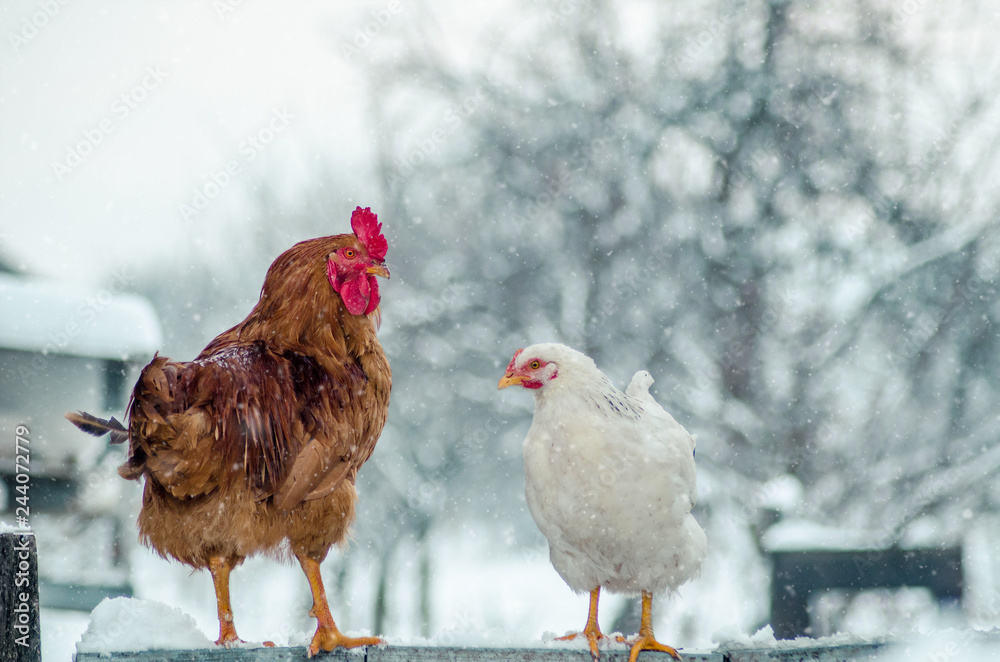
Heating the Coop
If possible, do not heat your coop. A well-ventilated, well-built coop that is the correct size for your flock should protect them from any harm due to weather. If you have an insulated coop, good ventilation, and proper roosting bars, most chicken flocks will roost close together and share warmth. Every year, there are tragic stories of loss of life and property from fires started by a heat lamp in a chicken coop.
Look for alternative heat sources if you absolutely feel that the coop needs heat. There are warming panels that attach to the wall behind the roost which reportedly work well, and you can also find heated roosting bars as well. It is worth looking into alternatives to the heat lamp if you think you will require extra heat when you winterize your chicken coop.
Acclimating to the Cold
One other thought about heated coops concerns adaptation. As the weather begins to change from fall to winter, your chickens have gone through their yearly molt and have grown in brand new feathers. These new feathers are especially qualified to fluff well and keep the chicken warm. When a coop is heated, the chicken relies less on its feather fluffing to keep warm. Should you lose electric power, your alternate heat sources will not work. Now, you have suddenly plunged your chicken into a cold situation with no preparation. This can be more detrimental to the flock than letting them acclimate to the cold gradually, using the feathers designed to keep them warm and insulated.
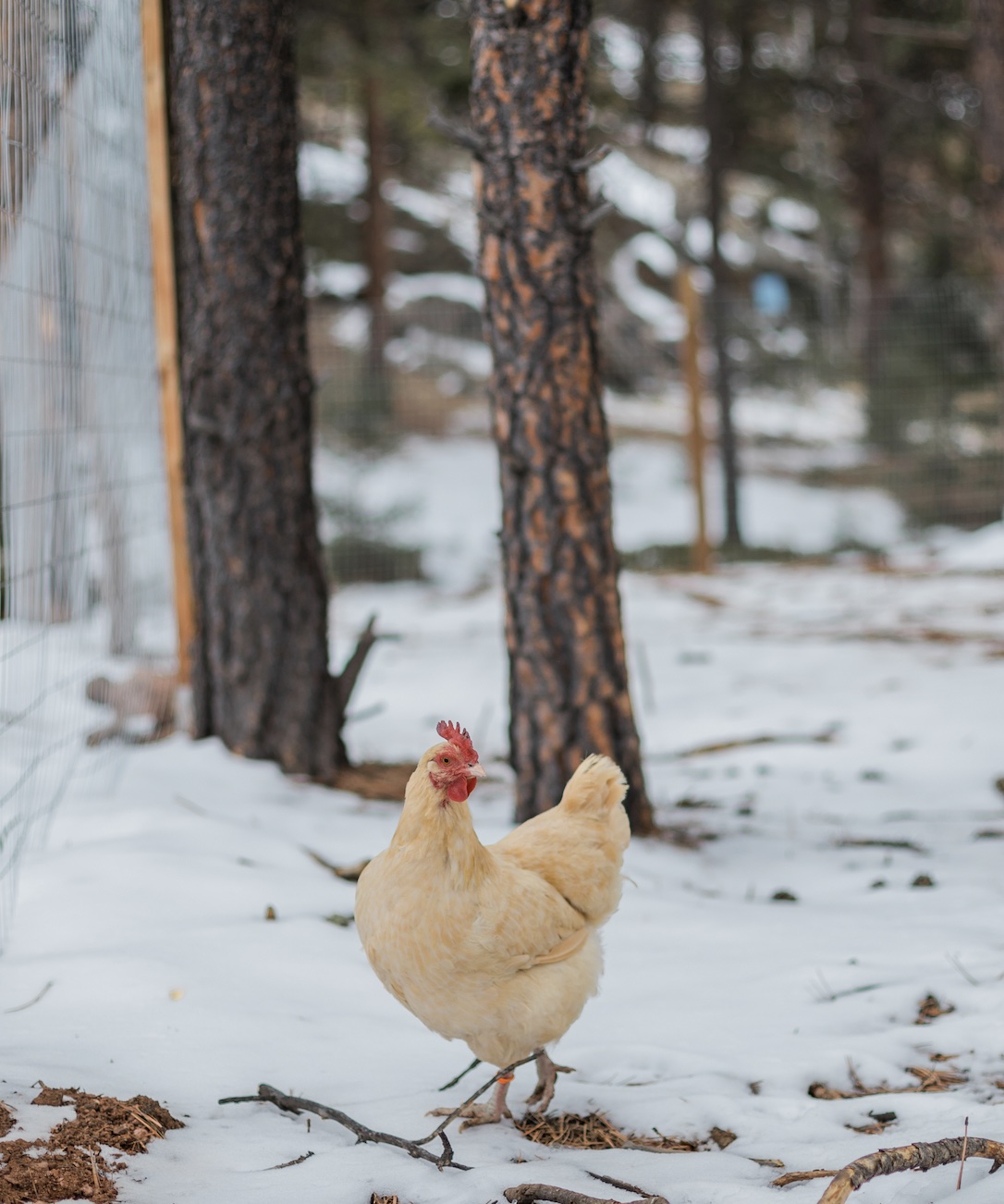
Chickens are amazing creatures that have existed for centuries. As you winterize your chicken coop, my best advice is to keep it simple. Provide a sturdy building, kept dry and ventilated. Feed your chickens daily and supply fresh water as necessary. Allow them some fresh outside air when possible, and your flock will fly through the winter weather. If you see a problem, address it quickly. Isolate any sick birds immediately. Bring warm treats when you can, and count down the days until spring arrives.
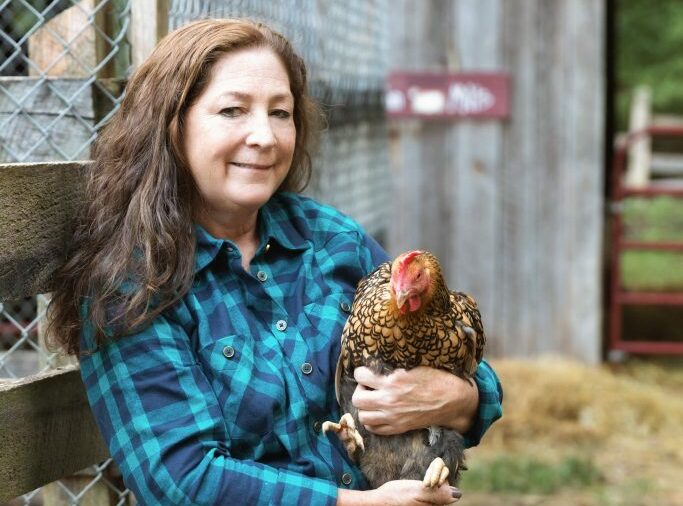
Janet Garman of Timber Creek Farm is an author, fiber artist and farmers with a love for animals and sustainable living. Janet has a degree in large animal farm management and animal science from the University of Maryland, and helps others learn to raise livestock, chickens, ducks, rabbits, and manage a small farm. Her articles on keeping animals, small farms and homesteading can be found in many popular websites. Janet has is the author 50 Do-it-Yourself Projects for Keeping Chickens, Chickens from Scratch and many books about fiber arts and farming with animals.

50 Do-it-Yourself Projects for Keeping Chickens, by Janet Garman, contains a variety of DIY projects with clear, step-by-step instructions. With many budget-friendly and upcycling projects, you can use items you already have on hand to create a wide range of items for your chickens
Photos courtesy of Cassandra Haring and Tonya Aragon.

